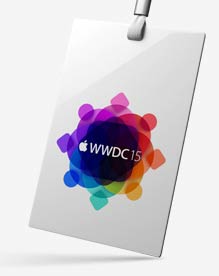Apple has several problems with WWDC 2015 that it didn’t have when Steve Jobs ran the company. It has three development platforms now, iOS, Apple Watch and MacOS; it doesn’t have the excitement Jobs brought to the table; and it is now competing against both Google and Microsoft. One thing is similar: It will be running against Windows 10, which is a huge move by Microsoft, potentially representing a Windows 95 level risk. Apple stepped up nicely, though, in both product and presentation.
Let’s talk about some of the other stuff around WWDC.
Chief Excitement Officer
I’d been advocating the chief excitement officer concept for a while. CEO Tim Cook isn’t good at building excitement; you need someone who is more of a cheerleader for that. I’ve always felt Apple could simply find someone else to take over that aspect of Jobs’ position. Well, it did, with Senior VP Craig Federighi. I’d have been a bit more subtle with this myself, but folks seemed to take to him and he added some much needed excitement to the event. In the end, this seemed a bit less than what I expected, so Apple could have just been pulling our legs.
MacOS Faster
Apple is saying that the MacOS will be 40 percent faster. People begin to notice a speed difference at 20 percent, so this is twice the minimum, and given how many have complained about performance issues with their thinnest laptops, this should be a godsend for people who have been experiencing performance issues. Apple didn’t spend a ton of time on MacOS. Spotlight search is also vastly improved, now more in line with Google. Finally, there is a much stronger focus on game developers, with strong graphics performance improvements.
The MacOS finally gets a split screen and the new code name of El Capitan. (I really miss the big cat names like Jaguar, Panther and Lion.)
iOS
Cortana, Microsoft’s digital assistant, up until now has been far better at complex tasks like setting appointments; Siri closes that gap now and will be run locally. The good side of this is that Siri will work if the phone doesn’t have a data connection; the bad side is that there is better performance in a cloud-based system because you don’t have the local power/performance constraints, just network capacity. It was hoped Apple would tie Siri to IBM’s Watson, but this appears to not be the case, at least for this round. There is now deep application linking, for instance, Kayak or OpenTable searches can be done from the home screen.
Improved performance, embedded windows (multi-tasking), and some solid keyboard improvements (that require skills I doubt many will develop, given how many have issues with gestures today) are on board. Overall, the changes seem to anticipate the larger-screened iPad coming shortly. More efficiency (better battery life) is also promised and there is a new native News app that will likely kill Flipboard.
Apple Pay Now on Steroids

Woman on Stage
Just a funny side comment: Jennifer Bailey came on stage to talk about the payment section and folks couldn’t remember the last time they had seen a woman on stage at this event. Apple has been under a lot of diversity pressure but rather than just praising the company for making progress, many seemed to use this as a reason to criticize Apple for the lack of it. Hey, it’s progress, people. If you want more of it, you might want to praise it rather than criticize it. Just saying…
$30B to Developers
Of all the stuff I heard about at this event, this is the most powerful for the audience. There were 100 billion apps downloaded from the iStore and developers made $30 billion. The large complaint about Android is that developers don’t make money on it. That isn’t the case with the iOS and the iStore. Personally, at a developer’s conference, I’d lead with this.
Apple Watch
Apple Watch is not an area of high excitement. It is clear that Apple and the audience are struggling with this because enthusiasm from the crowd was muted here. Apple is improving performance in software with an updated Watch OS with native apps. Some things, like watch customization, should have launched with the watch and given the delays getting this into the stores because of a parts shortage, this product remains at risk. Much of the presentation seemed to be about fixing known problems with the Watch, further supporting my recommendation that people wait for the third version of this product.
Streaming Music Service
The streaming music service is kind of funny because it is a service very similar to what Zune had and Jobs made fun of: a subscription service. Steve Ballmer is likely throwing some chairs around today. Given that there are a lot of established services like this, it seemed a bit old news, but something this platform had lacked from Apple, closing a competitive hole in the offering. Kind of makes you wonder what might have happened had Microsoft not tossed in the towel really early with Zune, though.
Wrapping Up: Solid Steps Forward, Watch Is Still an Issue
Overall, I see solid progress on the MacOS and iOS fronts, closing some exposures against Microsoft and Google and generally playing well to the Apple crowd. The most powerful point was how much money developers were making building for the iStore. The smart watch segment remains a problem, with Apple the strongest player in it, and from this, that’s not all that strong yet. I’m really pleased Apple is taking both the excitement and diversity aspects of these events more seriously and think the firm should be applauded for both moves.
In the end, this sets Apple up far better for the Windows 10 event in two months than its predecessors set up for Windows 95 and provided a sharp contrast to Android in the important areas. Nice work overall.
Rob Enderle is President and Principal Analyst of the Enderle Group, a forward-looking emerging technology advisory firm. With over 30 years’ experience in emerging technologies, he has provided regional and global companies with guidance in how to better target customer needs; create new business opportunities; anticipate technology changes; select vendors and products; and present their products in the best possible light. Rob covers the technology industry broadly. Before founding the Enderle Group, Rob was the Senior Research Fellow for Forrester Research and the Giga Information Group, and held senior positions at IBM and ROLM. Follow Rob on Twitter @enderle, on Facebook and on Google+



